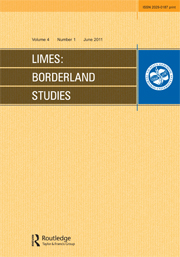LIMES: Cultural Regionalistics
LIMES: Cultural Regionalistics
Publishing House: Vilnius Gediminas Technical University
Subject(s): Politics / Political Sciences, History, Philosophy, Social Sciences
Frequency: 2 issues
Print ISSN: 2029-0187
Status: Ceased Publication
- 2008
- 2009
- 2010
- 2011
- Issue No. 1
- Issue No. 2
- Issue No. 1
- Issue No. 2
- Issue No. 1
- Issue No. 2
- Issue No. 1
- Issue No. 2
Articles list
{{ article.TitleOriginalLanguage }}
{{ article.TitleOriginalLanguage }}
({{ article.TitleEnglish }})
- Publication: {{ article.Publisher }} ({{ article.Issue }})
- Author(s): {{ article.Authors }}
- Contributor(s): {{ article.Contributors }}
- Language: {{ article.Language }}
- Subject(s): {{ article.Subjects }}
- Issue: {{ article.Issue }}
- Page Range: {{ article.PageRange }}
- No. of Pages: {{ article.NumberOfPages }}
- Keywords: {{ article.Keywords }}
- Summary/Abstract: {{ article.SummaryAbstract }}
- Price: {{ common.currency(article.Price) }}
Short Description
Research journal “Limes” publishes original peer reviewed papers concerning such fields of the humanities and social sciences as philosophy, political science, history and sociology. Also, the journal unites three educational establishments representing three countries: Vilnius Gediminas Technical University (Lithuania), University of Bialystok (Poland), Yanka Kupala State University of Grodno (Belarus) and Culture, Philosophy and Arts Research Institute (Lithuania). The title of the journal reflects the concept of this publication. The Latin word LIMES means a limit, a borderline, a boundary, a mark and a margin. The boundary and the limit are as old phenomena as the human civilization, though a border does not only separate territories, states and nations but also establishes the neighborhood between them. In this case, it arises as a wall on the one hand, as a door on the other hand and as a bridge on the third one. In any case, the border has influence on the ethos of the borderlands presupposing the way of life and the identity and historical memory of the local settlement. Not accidentally, the cultural studies of the borders or researches on the borderlands belong to the number of the most dynamic branches of the contemporary humanitarian knowledge. Every borderland is unique in a particular way. The borderland of Poland, Lithuania and Belarus is one of the most interesting regions to be researched. Existing in the geographical centre of Europe, this region has been a topos for ages where both differences and coexistence have taken place while political, ethnic-cultural and confessional factors interconnect. During one generation, configurations and functions of the borders of three neighboring countries have been changed. Nevertheless, a borderland as a historical-cultural phenomenon has been preserved with its characteristic features as the perpetual being of the Other. The research on the borderlands in the context of cultural regionalistics will become the trans-limited and interdisciplinary forum of the humanitarian, philosophical, sociological and cultural studies.

